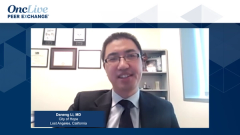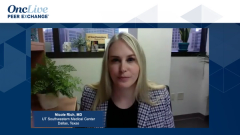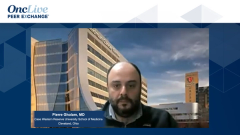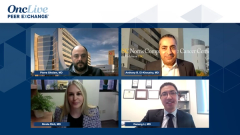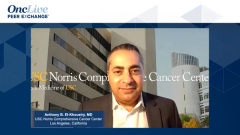
Frontline Therapies in Advanced HCC for Patients Unsuitable for Atezolizumab-Bevacizumab
Pierre Gholam, MD, considers the optimal treatment selection for patients in whom an atezolizumab-bevacizumab combination isn’t a suitable frontline therapeutic option.
Episodes in this series

Anthony B. El-Khoueiry, MD: Dr Gholam, let’s say you have a patient who isn’t an atezolizumab-bevacizumab candidate for some of the reasons that Dr Rich mentioned. What would be your alternative first-line regimen in a patient who isn’t an atezolizumab-bevacizumab candidate?
Pierre Gholam, MD: The answer is very much in flux. We await the regulatory process that will likely lead to the approval of new agents and doublets that might become available to patients in the foreseeable future. But let’s assume that’s the case, and we can potentially prescribe agents that are of promise at this point. If a patient has significant autoimmune disease that precludes the rational and safe use of immunotherapy, or if a patient has had a solid organ transplant where the evidence overwhelmingly supports not using I/O [immuno-oncology] in that setting, one would have to avoid any combination that includes immunotherapy agents. That leaves us with agents that we have grown to know and love, including TKIs [tyrosine kinase inhibitors], which still have a place in that setting. Lenvatinib and sorafenib are approved in the first line. They’re agents that can be used in those patients.
There’s the nuance of someone who could potentially receive immunotherapy but has issues related to VEGF-containing regimens—specifically bleeding mitigation, which we talked about before, and other issues. This is where crosstalk between hepatologists, medical oncologists, and the rest of the team is critically important. We oversimplify this by saying that all you need is an endoscopy within 6 months prior to initiation of therapy. We need a much more sophisticated approach that ensures that patients are treated in a timely manner and that unnecessary delays due to fear of bleeding are avoided.
The Baveno VII guidelines were recently published [in December 2021]. They provide a wealth of information about which patients probably don’t need an endoscopy to predict whether they’re likely to bleed. This is something our medical oncology colleagues would benefit from knowing. We’d probably be responsible for doing a better job of communicating these to the HCC [hepatocellular carcinoma] treater community at large. In that setting, if a patient has some prohibitive reason not to receive bevacizumab, a VEGF monoclonal antibody, then durvalumab-tremelimumab would be a reasonable option.
In the data from the HIMALAYA trial that were presented at the 2022 ASCO GI [American Society of Clinical Oncology Gastrointestinal Cancers Symposium], I noted 0 incidence of variceal bleeding. Granted, this was in all 3 arms, so no arm had any variceal bleeding. The incidence of hemorrhage of all causes was quite reasonable, whatever that means, but fairly spread out over the 3 arms. I believe there was more hemorrhage of all causes in the sorafenib arm than in the other 2 arms. On paper, that certainly seems like a reasonable non-VEGF option for patients who might have a significant risk of bleeding or other complications related to VEGF-type therapy.
Where you use lenvatinib vs sorafenib remains a somewhat complicated and experiential issue. In a setting where you can’t use I/O, and you want to use a TKI and you feel that the evidence for significantly improved PFS [progression-free survival] and ORR [objective response rate] drives your decision, which is a legitimate way to think about it, you might favor using lenvatinib. In a person who’s older, maybe Asian, and has an increased risk of developing hand-foot skin reaction, you might want to shy away from using sorafenib because of the perceived increased risk of severe hand-foot skin reaction. In a patient who’s pretty hypertensive to begin with, you might choose to use sorafenib because there appears to be a greater signal for grade 3 or 4 hypertension in lenvatinib vs sorafenib. That’s my somewhat haphazard decision-making process as I see it.
Anthony B. El-Khoueiry, MD: It’s your educated approach based on the data available and your own experience, which is very fair.
Transcript Edited for Clarity


